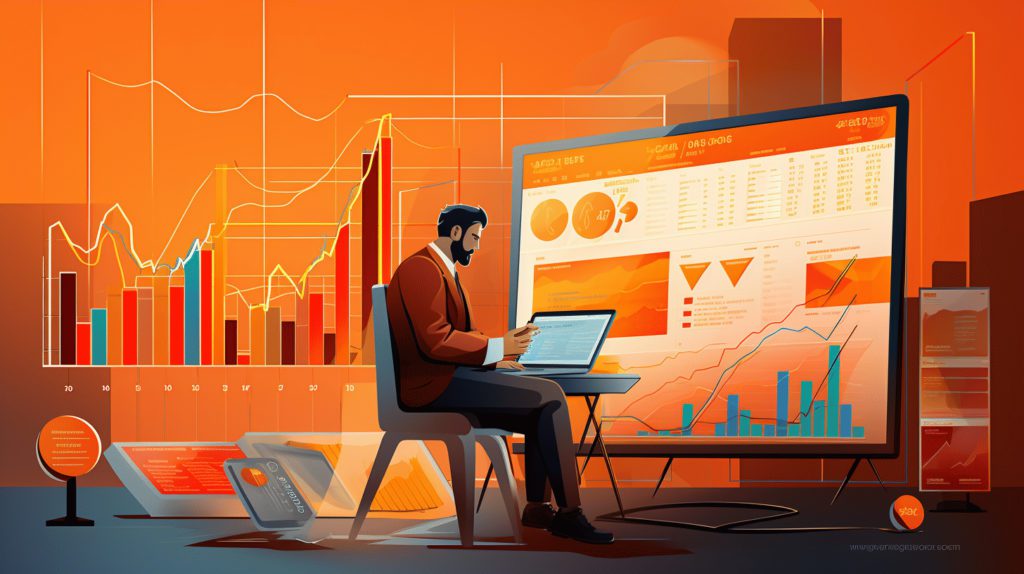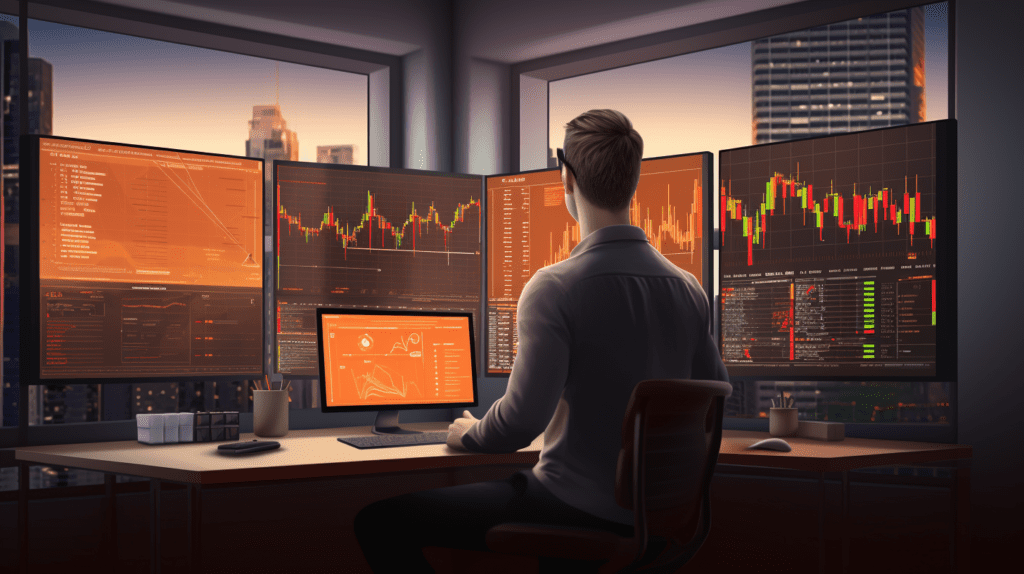Welcome to our brutally honest take on trading myths and realities! If you’ve ever wondered if investing in government Money Market Funds (MMFs) is just putting ‘dead money’ to rest or doubted the possibility of accurately predicting market movements, then you’re in for an enlightening read.
In this article, we debunk popular trading myths, dig into the misunderstood concept of a trade deficit, explain the value investing strategy, and even touch on controversial comparisons like investing versus gambling.
By the end of this engaging trek, we hope you’ll be equipped with an invigorated perspective and practical insights that could help enrich your trading journey! Let’s dive in, shall we? 🎢
Debunking Common Trading Myths
Have you ever pondered the vast world of trading, only to be deterred by a barrage of myths and misconceptions? Let’s toss these myths out the window and replace them with real investment knowledge. From the idea that investing in government money market funds (MMFs) is ‘dead money,’ to the notion that you can accurately time the market or need a weighty wallet to start investing, it seems there’s no shortage of misconceptions. In the light of trading myths, we’ve prepared this section for you, debunking common misconceptions and setting the record straight.
Myth #1: Investing in government MMFs is ‘dead money’
This myth is far detached from reality. In comparison to some more high-risk investments, government MMFs are a safe bet as they aim to maintain a stable value while offering a small return. Despite the lower risk and rewards, investors are not shying away from it. In fact, in March 2023 alone, a whopping $422 billion flowed into government MMFs. Rather than being considered ‘dead money,’ government MMFs offer a moderate return while also safeguarding your principal amount, making them a profitable and sensible choice for more conservative investors.
Myth #2: You can time the market
Every investor, at some point, has wished they were able to predict the future of the market. However, despite audacious claims, no one can accurately predict market movements. The market is influenced by countless factors, with political, economic, and social events all affecting stock prices. Trying to time the market is like trying to catch a falling knife – risky and likely to result in pain. Instead of attempting to time the market, consider a time-tested strategy like ‘buy and hold,’ which capitalizes on long-term investment rather than short-term market fluctuations.
Myth #3: You need a lot of money to start investing
This popular myth couldn’t be farther from the truth. The rise of online trading platforms has revolutionized the way we invest and has provided individuals with smaller budgets the opportunity to invest. Nowadays, with platforms offering trades at low or even no cost, a modest sum of money could be enough to dip your toes into the investing pool. As they say, “The best time to start investing was yesterday. The second-best time is today.”
To learn more, feel free to explore our detailed guide on Common Trading Myths Debunked. The investment world is filled with misconceptions. However, with the right understanding and continuous learning, you might be able to navigate its complex waters more confidently.
Trade Deficit Myths
Debunking common misconceptions about trade deficits can be quite an eye-opener. Politicians and even leading economists sometimes propagate these myths, and they’re worth discussing. The main assertion tends to be that a trade deficit is bad for the economy and represents a loss, but this viewpoint is oversimplified and misses some essential aspects of global trade.
When many people hear the term ‘trade deficit,’ they automatically associate it with something negative. However, a trade deficit is merely a numerical representation of the value of a country’s imports compared to its exports.
Here are some of the most pervasive myths about trade deficits and the reasons they don’t hold water:
- Myth 1: A Trade Deficit is an Economic Loss
- Myth 2: The Trade Deficit is Caused by Unfair Trade Practices
- Myth 3: Reducing the Trade Deficit means More Jobs
This belief is one of the most common misconceptions. In reality, a trade deficit doesn’t equate to a loss. When a country has a trade deficit, it simply means that it imports more goods and services than it exports.
While it’s true that certain industries may be affected by unfair practices, the overall trade balance is determined more by macroeconomic factors like national savings and investment rates.
Again, this is a superficial view. Job creation is linked to a multitude of factors, not just trade balance. A country with a trade deficit can also have a booming economy and low unemployment rates.
“Politicians often complain about the trade deficit, but it is largely misunderstood and its impact on the economy is misplaced.”
In essence, the trade deficit, like any other economic measure, is full of nuances that require careful dissection. Far from being an economic curse, it can, under certain circumstances, reflect strong consumer demand and an attractive investment environment. As with any economic indicator, it’s crucial to have a holistic understanding to make well-informed decisions and develop effective policies.
This discussion on trade deficit myths is not exhaustive and there’s still much more to learn. It’s essential to keep exploring, questioning, and unmasking these misunderstandings. Remember, more knowledge about international economics leads to smarter debates and better decision-making around trade policies.
Value Investing Strategy
Value Investing Strategy
Time Required for Researching Stocks and Making Trades
Common myth states that researching stocks and making frequent trades require extensive amounts of time and resources. However, with a strategic approach and adequate knowledge, you can streamline this process and optimize your trading schedule.
Investing in stocks can be an intimidating venture to dive into, particularly with the abundance of stocks available on the market to choose from. Vetted investors, beginners, or those on a tight schedule might feel daunted by this task. But worry not, the time you would need to expend is less intimidating than you might think!
Approaching Stock Research 🧐
Master the art of weaving through the vast financial ecosystem with the right approach. Let’s take a brief journey:
- You don’t need to research all the stocks. Focus on a select group that aligns with your investment goal and financial situation. 🎯
- Equip yourself with the right tools. Stock screening and data analytics tools can significantly cut down your research time. 💻
- Keep an eye on market trends but do not be swayed by every whim. Be patient and strategically pick the moments for action. ⏱️
Navigating this space can be more manageable than you imagine, with a strong foundation and clear direction.
Trade Time ⏳
Frequent trades might sound time-consuming, but the actual process is quick and can often be completed in a few minutes. With online trading platforms, you can execute trades instantly, right from the comfort of your own space.
“The best investor is a well-informed investor, not necessarily one who spends lengthy periods dwelling on potential investments.”
You have the power to dictate the time spent on researching stocks and making trades. Contrary to popular belief, it might not need as much time as initially perceived. Success lies in methodical planning and perseverance, not endless hours sunk into research and actions. Remember to take a balanced approach. After all, even in finance and investments, slow and steady does often win the race! 🐇🐢
Investing Is Not Equivalent To Gambling
Comprehending the intricacies of investment, particularly in stocks, is vital for anyone intending to get their feet wet in this field. It’s a common misconception that investing equates to gambling. Nevertheless, the truth remains that investing can never be equated to gambling, thanks to the methodical analysis and research that backs it up. Fortunes are not solely built on luck in the investment landscape.
- Understanding the Difference
When it comes to investing, calculated risk plays a key role. It’s about understanding the nuances of the market and making decisions based on a thorough analysis of a company’s performance and potential. Gambling, on the other hand, is purely driven by chance and probability. There’s no strategy, no research; it’s just a high-stakes game of luck and chance.
- Long Term Commitment Vs Instant Gratification
Investing calls for a long-term commitment. It’s about growing your wealth over time, allowing interest to compound and increase your investment. But with gambling, it’s an instant-gratification game. It’s all about the adrenaline rush that comes from the immediate result of win or loss.
- Control Vs Lack of Control
Another significant aspect that sets the two apart is the element of control. With investing, you get to have a certain degree of control over your investments. You can choose what stocks to buy, when to buy them, and when to sell. But with gambling, you simply bet on a particular outcome without any ability to influence it.
“Investing in stocks is not gambling, but a strategy backed by analysis and research. It involves time, patience, and understanding of market trends. On the contrary, gambling is impulsive and based on luck,” financial experts affirm.
The belief that investing is merely another form of gambling is a misconception that could steer potential investors away from the fruitful path of growing their wealth in a methodical way. Remember, investing isn’t about getting rich quickly; it’s about securing a prosperous future progressively.👍
Realizing that investing is a systematic approach based on research and analysis, while gambling relies purely on luck, can help you make informed financial decisions. So, don’t hesitate to enrich your knowledge about investing and chart a sound financial path for a secure and wealthy future!💰💹 Investment is a fruitful endeavor, not a game of chance.
The Stock Market Is Not A Form of Gambling
While some people might see it as a roll of the dice, the stock market is more akin to a game of chess; it requires strategy, patience, and understanding. Contrary to popular belief, the stock market is not a form of gambling but a platform for long-term investment and wealth creation. Let’s debunk this common myth and shed light on the real essence of stock market investing.
Expectation of Return
Here’s where the essence of investing in the stock market deviates from the notion of gambling.
- In Gambling: With gambling, each game or bet has a clear end. You either win or lose. The only expected return is the immediate outcome, which depends entirely on chance.
- In Stock Market Investing: Buying shares of a company is not a short-term, win-or-lose venture. It’s about owning a piece of a business and actively participating in its successes and failures. Share prices do fluctuate; nonetheless, investors expect a positive return over the long-term, driven by the company’s growth and profitability. Stock dividends are a bonus!
The Role of Knowledge
Both investing and gambling involve risk. However, the role of knowledge and strategy in mitigating this risk sets them worlds apart.
- In Gambling: Regardless of how well you understand a game, the outcome is fundamentally unpredictable. Sure, knowing poker rules may help you play better, but it can’t guarantee a win.
- In Stock Market Investing: Here, knowledge is your most powerful tool. Understanding a company’s financial health, analyzing market trends, and keeping tabs on the broader economy can guide your investment decisions and significantly lower your risk profile.
“As Warren Buffet aptly puts it, ‘Risk comes from not knowing what you’re doing.'”
Market Regulations
One distinguishing factor between the stock market and gambling is the level of regulatory oversight.
- In Gambling: Although legal in some places, gambling often operates in a grey area with less stringent regulations. The lack of transparency can sometimes lead to shady practices.
- In Stock Market Investing: Stock markets, on the other hand, are governed by strict regulations. Regulatory bodies such as the Securities and Exchange Commission (SEC) in the U.S. ensure transparency, fairness, and protection of investors’ interests.
To wrap this up, equating the stock market to a casino discredits the thoughtful process that marks successful investing. Sure, both involve risk and potential returns. However, long-term investing leans more on analysis, strategy, and patience—areas where the thrill-seeking nature of gambling falls short. Next time someone remarks, “the stock market, it’s all just gambling,” you’ll know better than to agree! 😉
South Korean Exports: A Reliable Measure of Global Trade Flows
Taking a glance at the movers and shakers of the global economy, South Korea’s tenacity cannot be overlooked. Over the years, the nation’s vibrant export sector has proven to be a reliable thermometer for measuring global trade flows. How so, you might ask? Let’s dive in and explore.
South Korea, colloquially known as the ‘Global Economic Canaries,’ has substantially grown its export-oriented economy, playing a pivotal role in the world’s trade flows. The country’s monthly export data is a crystal ball, affording global forecasters a peek into the future of international commerce.
A few key factors make South Korean exports a cogent indicator of global trade:
- Diverse Portfolio: South Korea maintains a diverse export portfolio. From electronics and automobiles to petrochemicals and ships, the country produces and exports a wide range of goods. This diversified portfolio mirrors the global demand pattern, making it an excellent gauge for worldwide trade.
- Global Footprint: Geographically, South Korea is ideally located at the crossroad of major global trade routes which allows them to tap into various markets. They have substantive trade relations with economies worldwide, amplifying the country’s export data significance.
- Fast-Reporting: South Korea typically releases its export data within the first few days of the month, much faster than most other nations.
The delightful complexity of South Korean exports represents not only the global demand for goods and services, but also the ebbs and flows of the world’s economy.
Analyzing South Korea’s export trends can help global economists, businesses, and policymakers discern patterns in the world’s economy and act accordingly. The swings in these data – whether unexpected leaps or sudden falls – may signal significant global shifts, representing the turning of the world’s economic gears.
Who’d imagined the economic pulse of the world could be felt through the hands of ‘Hallyu’ – the Korean Wave! Indeed, the monthly data release on South Korean exports is one of the best indicators of global trade trends. So, if you are keen to understand the rhythm of global commerce, keep an eye on South Korean exports.🌏💼📊
Conclusion
As we step back from the different facets of the trading world, we hope that our journey through these common trading myths has made it easier for you to understand the realities that define the market. Trading is not a game of chance, but a calculated and strategic pursuit that requires thorough research, patience, and understanding. And, you don’t need to be a billionaire to start—you can start investing with smaller budgets, thanks to the rise of online trading platforms.
The world of finance and trading can certainly throw a curveball, let alone the task of differentiating between the myths and realities that cloud your judgement. That’s where a community of astute traders can be a game-changer. A platform where you can learn from each other, share strategies, and bust more myths together. Market Masters forms just such a community—allowing you to embark on a clear path to financial success.
So, whether you’re a seasoned trader looking to brush up on your skills or a newcomer making your first foray into trading, the tools, expertise and community offered by Market Masters have got your back. After all, trading is not about believing in superstitions, but about making informed decisions that lead to lucrative outcomes. 🚀
Frequently Asked Questions
- Is day trading a guaranteed way to make money?
No, day trading is not a guaranteed way to make money. It requires knowledge, skills, and experience. While some traders may be successful, others can experience losses. It is important to approach day trading with caution and proper risk management.
- Do I need a large amount of capital to start trading?
No, it is not necessary to have a large amount of capital to start trading. It is possible to start with a small amount and gradually build it up over time. However, it is important to be realistic about the potential returns based on the capital available.
- Can trading be learned by anyone?
Yes, trading can be learned by anyone with dedication, willingness to learn, and a disciplined approach. It requires understanding market dynamics, technical analysis, risk management, and developing a trading strategy. Continuous learning and practice are essential for success in trading.
- Is it necessary to spend long hours in front of the screen for trading?
No, it is not necessary to spend long hours in front of the screen for trading. While active trading requires monitoring the market, making decisions, and executing trades, it is possible to adopt strategies like swing trading or position trading that involve less screen time.
- Can automated trading systems guarantee profits?
No, automated trading systems cannot guarantee profits. While they can execute trades based on predefined rules and algorithms, market conditions can change, leading to unexpected outcomes. It is important to monitor and fine-tune automated systems regularly.



